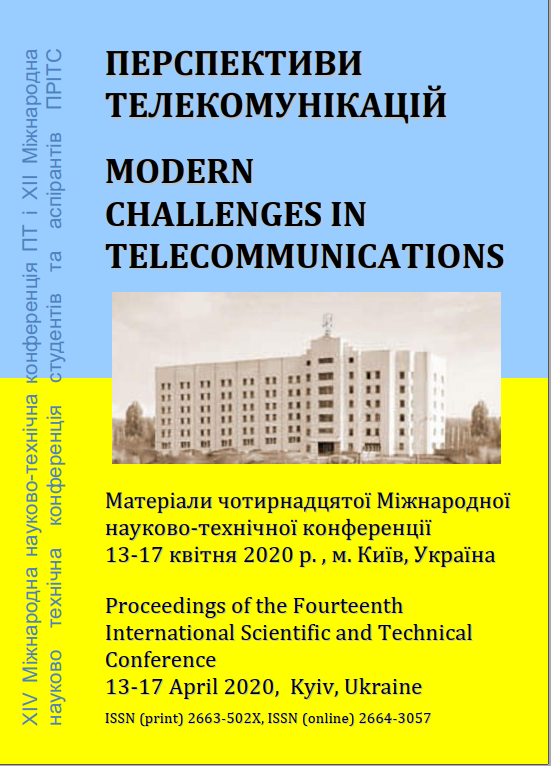АНАЛІЗ ОЦІНКИ ЯКОСТІ НАДАННЯ ПОСЛУГ ТЕЛЕКОМУНІКАЦІЙНИМ ПРОВАЙДЕРОМ
Ключові слова:
ONTOLOGY, WORKFLOW, DATA STRUCTURE, MICROSERVICES, ORCHESTRATOR, AUTOMATIZATION, QUALITY OF SERVICE, TELECOMMUNICATIONАнотація
Сучасний розвиток телекомунікацій та телекомунікаційних провайдерів вимагає дедалі більшого рівня надання послуг, адже формування ринку послуг мережевого зв’язку підвищило увагу до питань оцінки їх якості, як з боку контролюючих і регулюючих органів, так і з боку операторів зв'язку. Тому, щоб забезпечувати відповідність певному рівню якості надання послуг телекомунікаційні оператори власноруч розробляють алгоритми та рішення для оцінки якості надання послуг базуючись на різних критеріях. У даній статті пропонується новий інкапсульований підхід до розрахунку якості надання послуг телекомунікаційним оператором. Метою такого підходу є створення автоматизованого рішення для розрахунку оцінки якості надання послуг, використовуючи онтологічну модель даних та workflow, які в свою чергу забезпечують певну інкапсульованість та універсальність підходу. Запропонований підхід дозволяє зробити процес оцінки якості надання послуг прозорішим, та скоротити залученість експертів-аналітиків до цього процесу.
THE APPROACH TO QUALITY CONTROL OF TELECOMMUNICATION SERVICE PROVIDERS
The modern development of telecommunications and telecommunication providers requires an increasing level of service provision, because the formation of a market for network services has increased attention to issues of quality control, both by regulators and by providers themselves. To ensure compliance with the specified level of quality of service provision, telecommunication operators themselves develop algorithms and solutions to control the quality of service provision, based on different criteria. However, these solutions are not universal to different types (quantitative, qualitative, etc.) of service quality indicators. So, the main purpose of this work is to present improved approach to quality control of telecommunication service providers. The implementation of the proposed approach is performed using the ontological model of service quality indicators provided by the provider and the dynamically changing workflow, which provide versatility and automation of quality control of service delivery. process.
Посилання
Monograph / [L.S. Globa, M.A Popova, S.O Dovhii, etc.] // Computer ontologies and their use in the educational process. Theory and Practice. / [L.S. Globa, M.A Popova, S.O Dovhii, and others]. - Kyiv, 2013. p. 47-90
L.S. Globa Means of access to sources of knowledge and their use in the educational process / L.S. Globa, T.I. Andrushchenko, S.O. Dovhii. // Second edition, supplemented. - 2012.
Globa L. S. Integration of ontology-based databases and knowledge bases / L. S. Globa, O. S. Shtogrina, M. Y. Ternovoy. // Collection of scientific works of NTUU "KPI". – 2011. – №1.
Globa L. Increasing web services discovery relevancy in the multi-ontological environment / L. Globa, M. Kovalskyi, S. Oleksandr. // Springer, Cham. – 2015. – С. 335–344.
Koval A. The approach to web services composition / A. Koval, L. Globa, R. Novogrudska. // Springer international publication AG. – 2017. – №534. – С. 293–304.
Popova M. The Formation of Virtual Educational and Research Environment for Distant Education on the Basis of Introduction of Geo-Information System (GIS) Technology / M. Popova. // International Conference Abstracts of Main Speeches [“Ukraine and Montenegro: Present and Perspectives”], (Kyiv, 16 – 19 october 2012) / National Academy of Sciences of Ukraine, National Academy of Pedagogical Sciences of Ukraine, Montenegrin Academy of Sciences and Arts.
G Budin (2005), "Ontology-driven translation management", in Helle V. Dam (ed.), Knowledge Systems and Translation, Jan Engberg, Heidrun Gerzymisch-Arbogast, Walter de Gruyter, p. 113, ISBN 978-3-11-018297-2
Oberle, Daniel (2014). "How ontologies benefit enterprise applications". Semantic Web. IOS Press. 5 (6): 473–491. doi:10.3233/SW-130114.
##submission.downloads##
Як цитувати
Номер
Розділ
Ліцензія
Авторське право (c) 2020 Наталія Андріївна Юшко, Лариса Сергіївна Глоба, Марина Андріївна Попова

Ця робота ліцензується відповідно до Creative Commons Attribution 4.0 International License.
Authors who submit to this conference agree to the following terms:a) Authors retain copyright over their work, while allowing the conference to place this unpublished work under a Creative Commons Attribution License, which allows others to freely access, use, and share the work, with an acknowledgement of the work's authorship and its initial presentation at this conference.
b) Authors are able to waive the terms of the CC license and enter into separate, additional contractual arrangements for the non-exclusive distribution and subsequent publication of this work (e.g., publish a revised version in a journal, post it to an institutional repository or publish it in a book), with an acknowledgement of its initial presentation at this conference.
c) In addition, authors are encouraged to post and share their work online (e.g., in institutional repositories or on their website) at any point before and after the conference.

